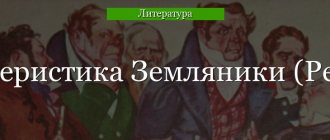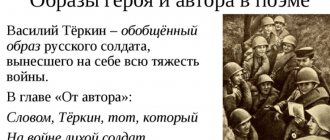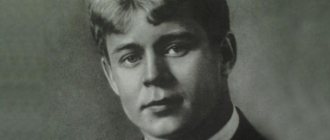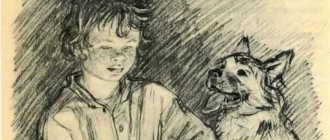- Essays
- On literature
- Gogol
- The image and characteristics of Chichikov in the poem Dead Souls
N.V. Gogol’s poem “Dead Souls” is distinguished by its variety of images of landowners, but one of the central and main ones is the characterization of Chichikov, the main character of the work.
It is known about the landowner’s appearance that he is neither thin nor fat, neither old nor too young (middle-aged). He was friendly, easily found a common language with people and an approach to each individual, which helped him buy up dead souls. The main character of the poem was an incredibly energetic person, with an incredible reserve of strength.
Chichikov loves to flatter people, secretive, as he does not tell anything about himself. Also, one of the characteristics of the landowner was veneration of rank. Chichikov held the post of collegiate adviser, although he did not come from a noble, poor family. He was well-mannered, resourceful, intelligent, persistent, thoughtful, neat, calculating, with good manners, he knew how to win people over. Chichikov is a purposeful person, he achieves his goal, and even managed to increase the amount he received.
His goal was to buy up dead serfs, that is, to become their owner only on paper. After purchasing a large number of them, for example thousands, he should have been given about 200 rubles for each. In the future, Chichikov wanted to buy himself an estate with this money. This tells us that he is a cunning, crafty, and to some extent dishonest person who deceived the souls of peasants from other landowners.
The author repeatedly notes Chichikov’s ability to adapt to the people around him:
With Manilov, he is good-natured, amiable and generally imitates the owner of the house.
With Korobochka he becomes abrupt and nervous, because the landowner does not understand anything, and he himself becomes a clubhead.
With Nozdryov, Chichikov is unpredictable, and could not become one, because he does not know what to expect from him.
With Sobakevich, the landowner does not even need to change his mind, since the owner of the house is the same as himself: thrifty, prudent, who was not even surprised at the news of the purchase of dead souls.
Chichikov was on an equal footing with Plyushkin, since Plyushkin was the most ordinary landowner. In general, he communicated with him their pity, since he saw how bad this man’s life was.
In his work, Nikolai Gogol wanted to show the image of a vile, rotten landowner, who truly was that same dead soul. Chichikov directs his enormous energy in the wrong direction, towards bad deeds.
Option 2
Pavel Ivanovich Chichikov is the main character of the work and personifies in his image the social situation of Russian reality of that time.
The writer reveals the image of Chichikov by narrating his meetings with representatives of the Russian landowner class for the purpose of buying up the papers of deceased peasants (dead souls).
Chichikov is a middle-aged man, pleasant-looking, reasonably well-fed, and has a flattering voice. Pavel Ivanovich serves in a fairly high rank of collegiate adviser.
From early childhood, Chichikov set himself the goal of achieving significant heights in life and acquiring enormous wealth, so he cultivated numerous abilities in himself. Pavel Ivanovich is well versed in mathematical sciences, since he received a good education and has mental logic and resourcefulness of mind. At the same time, Chichikov is distinguished by caution, prudence, and the ability to notice important details.
To achieve his own goals, the hero of the work can be cunning, crafty, patient, a sycophant, using psychological techniques known only to him to his interlocutor and changing his behavioral manner and speech style depending on the circumstances. At the same time, he is firm in his convictions on the path to obtaining wealth, so fear is not characteristic of him.
The image of Chichikov is characterized by incredible versatility, expressed in the ability to portray himself as a secular, literate and decent person with ostentatious goodwill, which is used only as a means of profitably using the location of the right people.
Skillfully adapting and adapting to every person he needs, Chichikov shows amazing resourcefulness, resourcefulness and perseverance. Communicating with the colorless Manilov, Pavel Ivanovich reveals himself in the image of a delicate, sensitive and helpful guest who knows how to sweetly flatter and fawn. Persuading the petty Korobochka to agree to a deal to sell dead souls, Chichikov reveals himself from the opposite side, as he acts rudely, arrogantly, assertively, without ceremony. In the estate of the narcissistic Nozdryov, the hero tries to the last to imitate the arrogant and deceitful owner, treating him familiarly in a boorish tone. Both with the rude Sobakevich and with the greedy Plyushkin, Chichikov skillfully and talentedly plays the roles he needs, forcing the landowners to sincerely believe him.
It is not difficult for Chichikov to change his appearance and behavior, since the characteristic qualities of the landowners form the basis of his own nature and are manifested in himself. However, unlike the landowners, Chichikov is endowed with extraordinary energy, business acumen, and determination, but all these traits of the protagonist are present in him in the absence of moral and moral principles, without hearing the quiet voice of conscience. After all, to obtain his own benefit, Chichikov resorts to fraud, deception, insults and bribery.
Describing the image of his hero, the writer presents an example of a person with a new way of life, a new formation, an entrepreneur with a commercial streak and striving to constantly receive his own income.
↑ Chichikov and Manilov
And in a conversation with Manilov, Chichikov is courteous, pleasant, showered with pleasantries both to the owner of the house and to the city officials, noticing that Manilov speaks well of them. Chichikov and the owner gave each other the honor of being the first to enter the door for so long that “finally both... entered the door sideways and somewhat pressed each other.” Chichikov readily picks up Manilov’s idea about the pleasantness of rural solitude with a friend, while distorting the Russian proverb - “Don’t have money, have good people to work with.” In a conversation with Manilov, he calls himself an “insignificant person.” Hearing that Manilov’s son’s name was Themistoclus, he dealt with his bewilderment, immediately hastening to return his face to its normal position.
Starting a conversation about dead souls, Chichikov “looked back for some unknown reason,” and this gesture of fear and uncertainty was repeated by the owner. Trying to explain to Manilov the motives for his purchase, Chichikov even blushed from the effort of expressing something that was not obedient to speech. He stumbled at the very first sentence, but then recovered, and his face took on a sedate expression.
Chichikov easily managed to convince Manilov that their enterprise would not be inconsistent with “civil regulations and further views of Russia.” When Chichikov found out that Manilov was giving him souls, he turned so hard in his chair that the woolen material covering the pillow burst. He said so many thanks to Manilov that he became confused. Chichikov himself, remembering what he had endured in life, “what grief <...> he tasted,” wiped away a tear with a handkerchief. When parting, Chichikov, with his hand on his heart, said: “ The pleasure of the time spent with you will remain here!” And believe me, there would be no greater bliss for me than to live with you, if not in the same house, then at least in the very closest neighborhood
».
Essay Characteristics and image of Chichikov
Chichikov is the main character of the work, where the entire poem is practically about him. When the poet made him the main character, he did not give any guarantee that the image of his created main character would please his readers. Already at the beginning of the poem, the image and character of Chichikov becomes clear. First, Ivan Vasilyevich shows his hero from the positive side. Pavel Ivanovich Chichikov knew how to communicate correctly and culturally with others, regardless of their age and status.
The author decides to tell about the biography of Chichikov, what he was like and what he became. From a young age, Pavel’s dad taught him the simplest truths of life, for example: that every coin must be treated wisely and taken care of. And this, truth, life, did not help him badly, he learned to find his own benefit in almost everything. With age, he learns to find a common language with people.
Chichikov graduates with honors and with a mark of impeccable behavior. Thinking about his future life, he imagines himself only as a successful and wealthy person. All the negativity of his character is revealed at his work in different places. Thanks to bribes and major frauds, he becomes successful. But he is quickly exposed, and complete bankruptcy occurs. As a result of several unsuccessful attempts to become successful, Pavel Ivanovich decides that he needs to acquire dead souls. He knew that during global checks, soul owners were hit hard. And he understood that it would be inexpensive to count those who died during the break between checks as alive.
And he decides to come to the city of officials, and dead souls become his goal. Being present at many events, he makes many friends with officials, and tries to find out from them who could provide him with dead souls.
The author reveals his character from the negative side, by the fact that he is cold-blooded and calculating. He makes friends there too. And having shown his qualities as a dreamer, he receives dead souls from them.
“A scoundrel,” Nikolai Vasilyevich Gogol calls him, since his bad qualities completely cover his positive traits.
Quotes Personality and character of Chichikov
Pavel Ivanovich Chichikov is a retired official. He holds a fairly high rank - the rank of collegiate adviser (belongs to class VI of the Table of Ranks):
“...Collegiate adviser Pavel Ivanovich Chichikov...”
By origin, Chichikov is a poor nobleman. He calls himself “a man without tribe or clan.” Chichikov's parents were nobles, but perhaps they did not inherit the nobility to their son. Thus, by birth Chichikov is perhaps a commoner and not a nobleman:
“...to a man without a tribe and clan!..” (Chichikov about himself)
“... The origin of our hero is dark and modest. The parents were nobles, but whether they were official or personal, God knows...”
In any case, having risen to the rank of collegiate councilor, Chichikov now has the right to hereditary nobility.
Pavel Ivanovich Chichikov was educated at a city school in the province. He showed no special talent in his studies, but behaved diligently:
“... He did not have any special abilities for any science; He distinguished himself more by his diligence and neatness...”
Mr. Chichikov is a reasonable person:
“...No matter how sedate and reasonable he was...”
"...forgetting my sedateness..."
The hero is a restrained and well-mannered person:
“...He didn’t even like to allow himself to be treated with familiarity in any case, unless the person was of too high a rank...”
Chichikov is a charming, charming, pleasant, amiable person, a “charmer”:
“... Chichikov with his charming qualities and techniques...”
“...Our hero […] charmed everyone...”
“... The ladies […] found in him a bunch of pleasantries and courtesies...”
“...our charming one...”
Knows how to please others:
“...one who really knew a great secret is liked...”
Chichikov knows how to behave well in secular society and can support a conversation on any topic:
“... The newcomer somehow knew how to find himself in everything and showed himself to be an experienced socialite. Whatever the conversation was about, he always knew how to support it... But it’s remarkable that he knew how to dress it all up with some kind of sedateness, he knew how to behave well. He spoke neither loudly nor quietly, but absolutely as he should. In a word, no matter where you turn, he was a very decent person..."
“...He easily and deftly exchanged pleasant words with some of the ladies...”
“...with rather deft turns to the right and left, he immediately shuffled his foot...”
Chichikov is an efficient, insightful and perspicacious person:
“... Such efficiency, insight and foresight was not only never seen, but not even heard of...” (Chichikov’s service at customs)
Chichikov knows the psychology of people well and knows how to find an approach to each person:
“...subtle twists of a mind that is already too experienced, knows people too well...” (about Chichikov’s mind)
“... where he made an impact with pleasant turns of phrase, where with a touching speech, where he smoked with flattery, which in no case spoiled the matter, where he slipped in some money...”
Pavel Ivanovich knows how to flatter his interlocutor in order to please him:
“... In conversations with these rulers, he very skillfully knew how to flatter everyone...”
Mr. Chichikov is a crafty man:
“... No,” Chichikov answered rather slyly, “he served as a civilian.”
Chichikov is a hypocrite, a liar. He pretends to be a man with a clear conscience and an impeccable reputation, but in reality he is a bribe-taker and a swindler (the story of bribes in the service, the story of “dead souls”):
“...what grief did you not taste, and why? for the fact that he observed the truth, that he was clear in his conscience […] - Here he even wiped away a tear that rolled out with a handkerchief...” (Chichikov does not talk about the fact that he took bribes in the service)
“...I am used to not deviating from civil laws in anything, although I suffered for this in the service...” (this is not true, in the service he deviated from the laws)
Having arrived in the city of N for “dead souls,” the hypocrite Chichikov charms local officials, so that they see in him a well-meaning, efficient, learned, knowledgeable, respectable, kind and courteous person:
“... The governor explained about him that he is a well-intentioned person; the prosecutor - that he is a sensible person; the gendarme colonel said that he was a learned man; the chairman of the chamber - that he is a knowledgeable and respectable person; the police chief - that he is a respectable and kind person; the wife of the police chief - that he is the most kind and courteous person ... "
Mr. Chichikov is neither a virtuous nor a highly moral person:
“... he is not a hero, full of perfections and virtues, this is clear...”
“...a virtuous person is still not taken as a hero...”
Pavel Ivanovich Chichikov is a purposeful person. He knows how to deny himself everything for the sake of his goal:
“...Even as a child he already knew how to deny himself everything...”
Chichikov is a cold-blooded person, he has a “cautiously chilled” character:
“...to feel every button, and all this was done with murderous composure, polite to the point of improbability...”
“... of a cautiously chilled nature...”
He is a calculating person:
“...he is like a subtle person and acts for sure...”
Pavel Ivanovich is a very patient person:
“... he showed patience, compared to which the wooden patience of a German is nothing...”
Chichikov has a strong and firm character:
“...We must do justice to the irresistible force of his character...”
“...the visitor was of a strong character...”
Apparently, Pavel Ivanovich is a thrifty person:
“...He himself decided to compose fortresses, write and rewrite, so as not to pay anything to the clerks...” (Chichikov himself draws up papers for the peasants)
Chichikov knows how to count well, he is strong in arithmetic:
“...he was strong in arithmetic...”
He is a neat and thrifty person:
“...the letter was folded and placed in a box, next to some kind of poster and a wedding invitation card, which had been preserved in the same position and in the same place for seven years...”
It’s hard to surprise him with anything, since he’s seen a lot in life:
“...He happened to see a lot of all kinds of people […] but he had never seen anything like this...” (Chichikov sees Plyushkin)
The calculating Pavel Ivanovich Chichikov, apparently, is not capable of loving anyone:
“... it is even doubtful that gentlemen of this kind […] are capable of love...”
He treats women with some disdain:
"..." Nice little grandma! - he said, opening the snuffbox and sniffing the tobacco..."
Pavel Ivanovich is a touchy person:
“...He is a touchy person and is dissatisfied if people talk about him disrespectfully...”
Apparently, Chichikov loves to eat. According to the author, he has an enviable appetite and stomach:
“...The author must admit that he is very envious of the appetite and stomach of this kind of people...”
Likes to drive fast:
“... because he loved driving fast...”
Chichikov does not speak French (this indicates his simple origin “from the people,” since educated nobles usually knew French):
“... Chichikov didn’t know French at all...”
Mr. Chichikov does not dance at balls:
"...never danced..."
Chichikov does not like to play cards:
“...I’m not at all interested in playing...”
Pavel Ivanovich does not smoke because he takes care of his health:
“... No, I don’t smoke […] I haven’t made a habit, I’m afraid; They say the pipe is drying out..."
By nature, Chichikov is an “acquirer”, a materialist. Most of all he is interested in the material side of life:
“...Who is he? So he's a scoundrel? […] It is fairer to call him: owner, acquirer. Acquisition is the fault of everything; because of him, deeds were carried out, which the world gives the name of not very pure ... "
He dreams of becoming rich and leaving an inheritance to his future children. Apparently, this is one of the reasons why Chichikov is starting his incredible scam with “dead souls”:
“...what will my children say later? Well, they will say, my father, the bastard, didn’t leave us any fortune!” It is already known that Chichikov cared greatly about his descendants..."
Essay 4
The poem "Dead Souls" is considered Gogol's best creation. The idea for the content of the book was suggested to the author by A.S. Pushkin. In the poem, the author described the life activity and morals of social strata of society. The book fully describes the owners of serf souls, landowners and officials.
The main character of the book is Pavel Chichikov. From beginning to end of the work, Chichikov remained a mysterious character. He was a man of many characters and was constantly changing. He copied the conversational manners and actions of his acquaintances. The guy studied all people and could get out of any situation, and did not miss his advantage.
With Manilov, the hero behaved arrogantly, flatteringly and kindly. When communicating with the arrogant deceiver Nozdryov, he tried to become like his interlocutor for his own benefit. Chichikov managed to please Plyushkin, who had lost touch with the real world and courtesy. For his own benefit, the hero played the role of a man inclined to kill a peasant in order to save himself from paying taxes.
It was not difficult for Chichikov to constantly change his appearance, since he possessed the characteristic features inherent in rich landowners. Left alone with himself, the hero showed his true qualities. Walking around the city, Pavel Chichikov tore off the glued poster to read it later. He read the poster and put it in the box. So he repeated Plyushkin’s habit. The uncertainty and colorlessness of the character of the hero reveal his similarity with Manilov. And so city officials speculated, trying to unravel Paul's identity. The habit of putting all things in their places brings the hero closer to Korobochka. Nozdryov found similarities between Chichikov and Sobakevich. Chichikov reflected all the character traits of the landowners, Manilov’s love of empty chatter, pettiness and narcissism, hoarding and rudeness.
At the same time, the hero stands out for his own qualities. Unlike landowners and officials, the hero had special energy, determination and business acumen. The activities of officials significantly influenced Chichikov’s behavior and speech. As time passed, Chichikov’s soul, like that of the landowners, became completely dead. Pavel was deprived of all human feelings and did not enjoy life at all. To achieve his goal, he showed neither anger nor joy. Towards the end of the poem, the author described the biography of Chichikov. Pavel's childhood was dull. He did not experience maternal love. He had no friends. He had to endure the reproaches of his sick father. His childhood had a negative impact on his future. As an inheritance from his father, Chichikov received only the instruction to study well and save his last penny. The boy learned the instructions well and set himself the goal of becoming wealthy.
Chichikov's essay - the hero of the work Dead Souls
Chichikov is considered the central figure of this poem. A middle-aged man who grew up in a low-income family. It should be noted that the parents taught the child to work constantly. Chichikov wanted to become a wealthy man. When the guy went to study, his father advised him not to quarrel with teachers. Chichikov was obliged to budget economically and not waste money. His father recommended wealthy people to him, as they bring practical benefits.
Chichikov, listening to his father, studied wonderfully and was grateful to his teachers. He came up with different combinations that brought him money. He asked his classmates to give away their things, and then he put them into sale. Pavel turned out to be a smart and intelligent person. One day he made a fake out of wax and made money. Then he took the mouse, trained it, sold it, and made a good profit. The guy constantly calculated his actions. He did great math in his head.
His appearance attracted the attention of women. He had attractive facial features. He had a thick build.
Paul's main goal was to gain wealth. He wanted to live well. Chichikov wanted to provide a decent life for his children. After completing his studies, he went to work. Higher officials liked him because he fulfilled their whims. When Chichikov got used to it, he began to take bribes, so he was fired. Then he collected decent money.
He came up with different combinations. One day he came up with the idea of buying dead souls and selling them at high prices as living ones. Chichikov was a wonderful psychologist. He endeared himself to people. He systematically lied and deceived other people. He pretended to be a well-mannered man. He played the role of a trustworthy citizen wonderfully. However, his lack of knowledge of French indicated that he was from a poor family.
Basically, Pavel turned out to be a man who seeks profit. He always had money. Chichikov gave poor people money for food. He avoided women, because he understood that he would not get any good from them.
Chichikov cannot be considered a completely bad person. He has valuable spiritual qualities, but he has more bad character traits. The man fit perfectly into the system, was an egoist and a stingy person. However, he knew how to have fun and sympathize.
Try to use this information to write an essay based on the image of Chichikov in a specific poem.
For 9th grade






